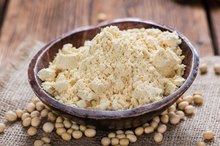Benefits of Acacia Powder
Acacia powder is made by grinding up acacia gum, which is naturally produced by the acacia tree, an evergreen belonging to the legume family that is native to Africa. Consumed as a dietary supplement for its high soluble-fiber content, acacia powder can be taken in capsule or tablet form, or as a loose powder. It can help increase your fiber intake, and it may also contribute to the loss of body fat.
Increases Fiber Intake
Acacia powder is a good source of insoluble fiber, and it is commonly taken to increase fiber consumption and help alleviate constipation. A 1-tablespoon serving of the powder has 6 grams of fiber, which provides between 21 and 29 percent of the recommended dietary allowance, or RDA, of fiber for adult women, and between 16 and 20 percent of the RDA for men. Most Americans do not consume enough fiber, according to the University of Maryland Medical Center, and acacia powder can help you get your daily recommended amount of fiber. A diet high in fiber may help lower blood cholesterol and the risk of heart disease.
May Help Reduce Body Fat
Metamucil Benefits
Learn More
In 2012, the “Nutrition Journal” published a study on the effects of gum Arabic, which is derived from acacia powder, on body mass index and body fat percentages in healthy women. Researchers found that participants who consumed 30 grams of gum Arabic every day for six weeks experienced lower body weight, as evidenced by a lower body mass index count. There was also a reduction of over 2 percent of body fat at the end of the study for those who consumed the gum Arabic supplement. The study concluded that gum Arabic could significantly reduce body mass index and body fat percentage in healthy women, and that it had the potential to be used to treat obesity.
Using Acacia Powder
Available in health food stores, acacia powder can be consumed on its own as a supplement. It is important to consume the powder -- as much as 1 tablespoon -- with at least 8 ounces of fluids, such as water or juice. Because it is high in fiber, you need to make sure that you drink enough water throughout the day to reduce the risk of constipation. The Food and Drug Administration has approved acacia powder and acacia gum as texturizers, emulsifiers, stabilizers and thickeners in foods, so they are added to many prepared foods, such as breakfast cereals, candies, drinks and baked goods.
Side Effects
Side Effects of Zymex
Learn More
When consumed orally, acacia is not toxic, but if you are allergic to dust, you may develop lesions or experience asthma attacks when you first start taking acacia, according to Purdue University. The researchers who published their findings in the “Nutrition Journal” article also noted that acacia gum produced some unpleasant side effects. Over the course of the first week, the supplement created an unpleasant feeling in the mouth, bloating, some mild nausea and diarrhea.
Related Articles
References
- Purdue University: Acacia Senegal (L.) Wild
- IBS Tales: Acacia Fiber
- NOW Foods: Acacia Fiber Organic Powder
- FoodNavigator-USA.com: FDA Approves Expanded Use of Acacia Gum
- University of Maryland Medical Center: Fiber
- Nutrition Journal: Effects of Gum Arabic Ingestion on Body Mass Index and Body Fat Percentage in Healthy Adult Females - Two-Arm Randomized, Placebo Controlled, Double-Blind Trial
Writer Bio
Marie Dannie has been a professional journalist since 1991, specializing in nutrition and health topics. She has written for "Woman’s Own," the "Daily Mail," the "Daily Mirror" and the "Telegraph." She is a registered nutritionist and holds a Bachelor of Science degree with honors in food science from the University of Nottingham.









